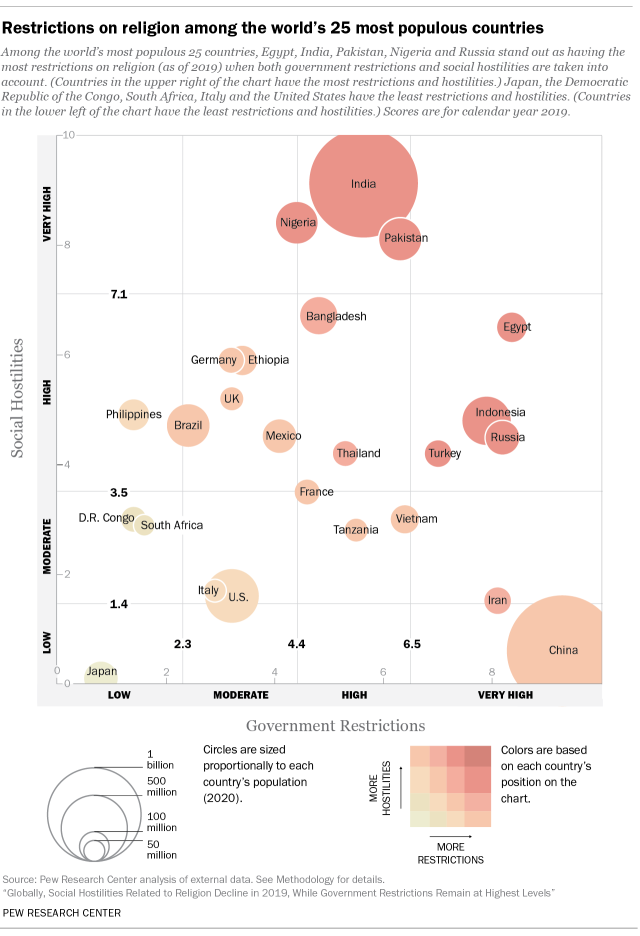One way to examine the reach of religious restrictions is to look just at the world’s 25 most populous countries. Of course, religious restrictions do not affect everyone within a country equally, but looking at government restrictions and social hostilities in these 25 countries – which claim three-quarters of the global population, or more than 5 billion people – can provide insight into how a large portion of the world’s population is impacted by restrictions on religion.
In 2019, Egypt, India, Pakistan, Nigeria and Russia had the highest overall levels of combined government restrictions and social hostilities involving religion among these 25 countries. Within this group, Japan, the Democratic Republic of the Congo, South Africa, Italy and the United States had the lowest overall scores.61
When it comes to government restrictions alone, China, Egypt, Russia, Iran and Indonesia had the highest levels of restrictions and all ranked in the “very high” category. Among the 25 most populous countries in the world, the countries with the lowest levels of government restrictions were Japan, the Democratic Republic of the Congo, the Philippines, South Africa and Brazil; all of these fell into the “low” category of government restrictions except for Brazil, which was in the “moderate” category.
The most populous countries with the highest levels of social hostilities involving religion were India, Nigeria, Pakistan, Bangladesh and Egypt, all of which fell into either the “high” or “very high” category in 2019. Meanwhile, Japan, China, Iran, the United States and Italy had the lowest levels of social hostilities among the 25 most populous countries in the world, though only China and Japan were categorized as having “low” levels of social hostilities. Iran, the U.S. and Italy had “moderate” levels of social hostilities involving religion.
In some cases, a country’s category for government restrictions matches its category for social hostilities. For instance, Japan had both “low” government restrictions and “low” social hostilities in 2019, while Thailand scored “high” on both measures. There also are cases when countries have GRI and SHI scores that look very different. For example, China had the highest score on the Government Restrictions Index out of all 198 countries and territories included in the study, yet it had “low” levels of social hostilities involving religion.
In 2019, none of the world’s 25 most populous countries experienced large changes (2.0 points or more) in their GRI scores, and most experienced small changes (less than 1 point). Four of the 25 most populous countries shifted from one category to another on the GRI: Vietnam dropped from the “very high” to the “high” category, while Nigeria dropped from “high” to “moderate” and the Democratic Republic of the Congo dropped from “moderate” to “low.” Brazil, which experienced an increase in its GRI score, rose from “low” to “moderate” levels of government restrictions on religion. Brazil’s score rose due to reports that authorities enforced restrictions on religious head coverings in 2019, while the score fell in the Democratic Republic of the Congo because there were no reports of detentions, physical assaults or killings of Christians.62 (In 2018, security forces in the country targeted Catholics and Protestants protesting in support of credible elections.63)
Similarly, looking at changes in Social Hostilities Index (SHI) scores, none of the 25 most populous countries experienced large changes of 2.0 points or more. However, nine countries – the Democratic Republic of the Congo, Egypt, France, Indonesia, Iran, Italy, Mexico, South Africa and the U.S. – had modest declines between 1.0 and 1.9 points. Egypt fell from the “very high” to the “high” category on the SHI, while the Democratic Republic of the Congo, South Africa and France went from having “high” to “moderate” social hostilities involving religion. Egypt’s score on the index fell partially because there were no reports of abductions of Coptic Christian women, unlike in previous years.64 And in South Africa, there was a decline in injuries and killings resulting from terrorism related to religion between 2018 and 2019.65





